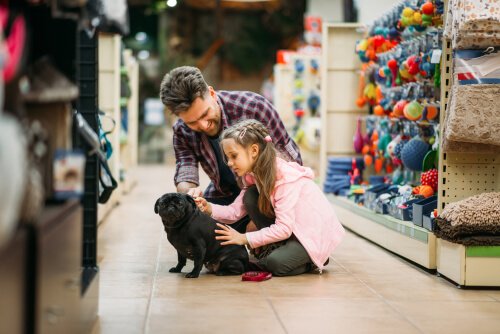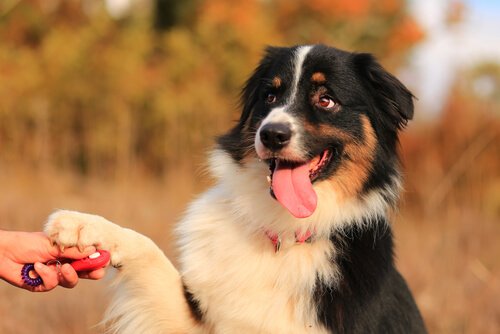Having a Pet Will Make You a Happier Person


Written and verified by the lawyer Francisco María García
As a pet owner, you know that a pet brings happiness into the home and they will make everyone happier that comes in contact with the animal.
It’s scientifically proven that pets can make their owners happier because they help them forget all of their problems in their every day lives.
In what ways can pets can make us feel happier?
Some psychologists at the University of Miami have discovered that pet owners have a higher quality of life. Also, they’re more sociable people because they’re used to constant interaction with another living being. This makes them more empathetic and friendly.
The same study revealed that people who have pets develop better self-esteem and tend to be more reliable when building a relationship.
Pets and children
Due to the fact that children can learn so many things from owning an animal, it’s highly recommended to have pets at home with your kids. According to studies, children who own dogs and cats are more sociable than those that don’t.
Remember that allowing your children to take care of a pet, by attending to their grooming and feeding, will help them develop a sense of responsibility.

It’s also estimated that 63% of pet owners think of their pets as family members. This is especially because it helps them develop a strong bond between pet and owner.
Pets and mental health
It’s a proven fact that petting a dog can increase the activity of neurotransmitters. It can also increase endorphin, dopamine, oxytocin and prolactin levels. Also, they can active other hormones that will make a person feel happier.
It’s also been shown that just by thinking about pets and other animals in our everyday lives can help get rid of sadness caused by rejection or social isolation.
Animals and pets are used in therapy for people who are depressed, who have autism or down syndrome. Dogs are also used for therapeutic purposes in elderly people because they provide them with company, which is a technique called zootherapy.
Pets are also useful for people recovering from traumatic experiences. It’s known that people who live with animals recover faster from a bad experience than being with a friend or partner.
Below are the main reasons why a pet makes us feel better:
- Animals attract our attention, which distracts us and helps us relax
- Pets offer social support, which regulates our stress
- They offer physical contact with another living being, which is great for the body and mind

Pets can even help university students or those who work from home. It helps them feel accomplished and less depressed.
Pets and physical well-being
Having a pet can help you combat a sedentary lifestyle. Dog owners are 54% more likely to do the recommended a single person’s amount of daily exercise. Children also benefit from physical activity when they have a dog.
Adopting a dog or cat can also lower your blood pressure levels. This is helpful for people who suffer from stress attacks, pets are even better than medications. A study proved this in the United States that was conducted on hypertensive stockbrokers living in New York City.
Another study conducted by Swiss researchers demonstrated that interacting with a dog can reduce your heart rate and the stress hormone cortisol.
Due to all of these reasons, having a pet in your home will make your life much more enjoyable. A pet helps you stay healthy, both physically and mentally. Although they’re a great responsibility, they’ll continuously show how grateful they are by giving you lots of affection.
As a pet owner, you know that a pet brings happiness into the home and they will make everyone happier that comes in contact with the animal.
It’s scientifically proven that pets can make their owners happier because they help them forget all of their problems in their every day lives.
In what ways can pets can make us feel happier?
Some psychologists at the University of Miami have discovered that pet owners have a higher quality of life. Also, they’re more sociable people because they’re used to constant interaction with another living being. This makes them more empathetic and friendly.
The same study revealed that people who have pets develop better self-esteem and tend to be more reliable when building a relationship.
Pets and children
Due to the fact that children can learn so many things from owning an animal, it’s highly recommended to have pets at home with your kids. According to studies, children who own dogs and cats are more sociable than those that don’t.
Remember that allowing your children to take care of a pet, by attending to their grooming and feeding, will help them develop a sense of responsibility.

It’s also estimated that 63% of pet owners think of their pets as family members. This is especially because it helps them develop a strong bond between pet and owner.
Pets and mental health
It’s a proven fact that petting a dog can increase the activity of neurotransmitters. It can also increase endorphin, dopamine, oxytocin and prolactin levels. Also, they can active other hormones that will make a person feel happier.
It’s also been shown that just by thinking about pets and other animals in our everyday lives can help get rid of sadness caused by rejection or social isolation.
Animals and pets are used in therapy for people who are depressed, who have autism or down syndrome. Dogs are also used for therapeutic purposes in elderly people because they provide them with company, which is a technique called zootherapy.
Pets are also useful for people recovering from traumatic experiences. It’s known that people who live with animals recover faster from a bad experience than being with a friend or partner.
Below are the main reasons why a pet makes us feel better:
- Animals attract our attention, which distracts us and helps us relax
- Pets offer social support, which regulates our stress
- They offer physical contact with another living being, which is great for the body and mind

Pets can even help university students or those who work from home. It helps them feel accomplished and less depressed.
Pets and physical well-being
Having a pet can help you combat a sedentary lifestyle. Dog owners are 54% more likely to do the recommended a single person’s amount of daily exercise. Children also benefit from physical activity when they have a dog.
Adopting a dog or cat can also lower your blood pressure levels. This is helpful for people who suffer from stress attacks, pets are even better than medications. A study proved this in the United States that was conducted on hypertensive stockbrokers living in New York City.
Another study conducted by Swiss researchers demonstrated that interacting with a dog can reduce your heart rate and the stress hormone cortisol.
Due to all of these reasons, having a pet in your home will make your life much more enjoyable. A pet helps you stay healthy, both physically and mentally. Although they’re a great responsibility, they’ll continuously show how grateful they are by giving you lots of affection.
This text is provided for informational purposes only and does not replace consultation with a professional. If in doubt, consult your specialist.








